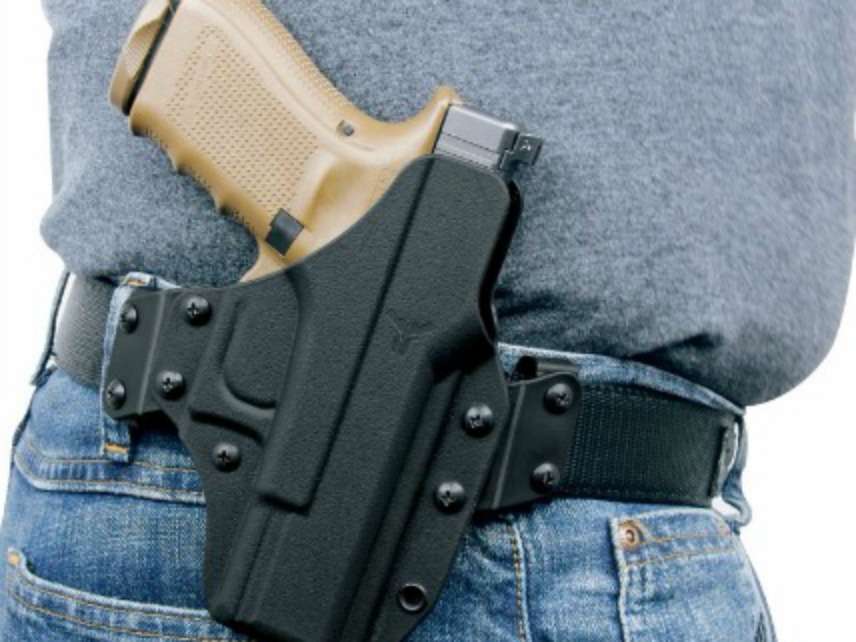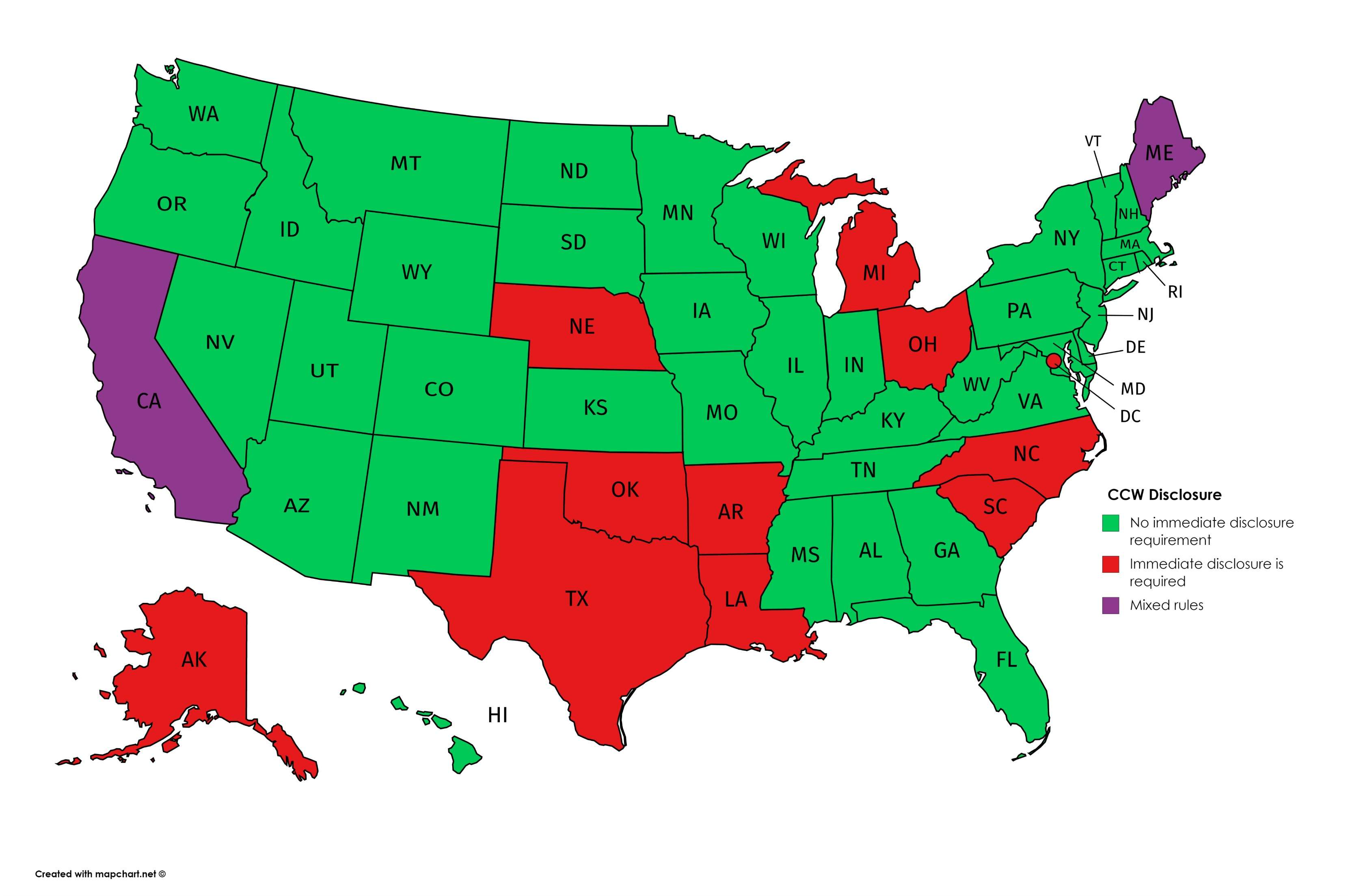In Light of the Philando Castile Shooting, Should You Tell That Cop You Have a Gun?
Ten states and D.C. say you must.

Philando Castile was trying to avoid trouble when he informed the police officer who pulled him over that he was carrying a pistol. But as everyone who has followed the case knows, the disclosure quickly set off a chain of events that led to Castile's death. The officer who stopped him, Jeronimo Yanez, panicked and shot Castile as he was reaching for his pocket, apparently to retrieve the driver's license that Yanez had requested. Had Castile said nothing about the gun, he in all likelihood would still be alive.
The shooting, which happened nearly a year ago in Falcon Heights, Minnesota, led to criminal charges against Yanez, who was acquitted of second-degree manslaughter on June 16, and a $3 million civil settlement announced this week. The horrifying incident also reinvigorated an old debate about how people who are licensed to carry a concealed weapon (CCW) should handle interactions with police.
Minnesota, like most states, does not require CCW licensees to inform law enforcement officers that they are armed. But police generally prefer to be told so as to avoid unsettling surprises. For that reason many gun owners argue that disclosure is considerate and prudent, while others worry that it will escalate a routine traffic stop into a tense, unpleasant, and possibly life-threatening encounter. Even if an officer does not react as Yanez did, he might insist on taking possession of the gun and unloading it, which could be dangerous if he is unfamiliar with the weapon.
"If you're carrying legally," writes one gun owner at usacarry.com, "you should have nothing to worry about, even with an overzealous rookie. I'd prefer to notify over having the LEO catch a glimpse (for whatever reason) on their own and go into panic mode. I don't like kissing pavement." Another participant in the discussion takes a different view: "I do not want an untrained or poorly trained officer putting me in danger while he is trying to unload my gun." He adds: "What does your legally carrying a concealed weapon have to do with a legally conducted traffic stop? There is no surprise because it doesn't come up. There is no scary dash cam video possible because you are a law abiding citizen simply executing your constitutional right….I have no problem with anyone who wants to notify, but I do believe that presents the possibility of everyone involved being put in danger if the officer decides to take possession of the gun."
Regardless of where they come down on this question, gun owners agree that the conversation should begin with an understanding of the relevant legal requirements, which vary from state to state and sometimes even from one local jurisdiction to another. The most common rule requires that someone carrying a handgun keep his CCW permit with him and present it to police on demand. Colorado's law, for example, says "the permittee shall carry the permit, together with valid photo identification, at all times during which the permittee is in actual possession of a concealed handgun and shall produce both documents upon demand by a law enforcement officer."
Ten states and the District of Columbia go further, requiring an armed person stopped by police to immediately disclose that he has a gun. In Texas, for example, "if a license holder is carrying a handgun on or about the license holder's person when a magistrate or a peace officer demands that the license holder display identification," he is obligated to "display both the license holder's driver's license or identification certificate issued by the department and the license holder's handgun license."
The District of Columbia demands that a licensee "disclose to the officer that he or she is carrying a concealed pistol," "present the license and registration certificate," "identify the location of the concealed pistol," and "comply with all lawful orders and directions from the officer, including allowing a pat down of his or her person and permitting the law enforcement officer to take possession of the pistol for so long as is necessary for the safety of the officer or the public." Ohio is even more prescriptive:
If a licensee is the driver or an occupant of a motor vehicle that is stopped as the result of a traffic stop or a stop for another law enforcement purpose and if the licensee is transporting or has a loaded handgun in the motor vehicle at that time, the licensee shall promptly inform any law enforcement officer who approaches the vehicle while stopped that the licensee has been issued a concealed handgun license and that the licensee currently possesses or has a loaded handgun; the licensee shall not knowingly disregard or fail to comply with lawful orders of a law enforcement officer given while the motor vehicle is stopped, knowingly fail to remain in the motor vehicle while stopped, or knowingly fail to keep the licensee's hands in plain sight after any law enforcement officer begins approaching the licensee while stopped and before the officer leaves, unless directed otherwise by a law enforcement officer; and the licensee shall not knowingly have contact with the loaded handgun by touching it with the licensee's hands or fingers.
As the Texas example shows, you cannot assume that disclosure is optional in a state with relatively permissive gun laws. The converse is also true. Hawaii has strict gun laws, and getting a CCW permit there is very difficult. But according to handgunlaw.us, the lucky few who are allowed to carry guns are not legally required to disclose that fact upon contact with the police.
In addition to the 10 states that require immediate disclosure (red in the map below) and the 38 that do not (green), two states have mixed rules (purple). Although California has no law requiring people with guns to tell police they are armed, usacarry.com reports that "some counties (Orange County in particular) require that during any contact with law enforcement, you must 'immediately announce' you are carrying a concealed weapon and have a license to do so." Handgunlaw.us likewise notes that "some Issuing Authorities [in California] are putting a restriction on issued Permit/Licenses that the holder must inform any Police Officer that contacts them [in] any type of official capacity."
Maine, which since 2015 has allowed people to carry concealed weapons without a permit, says someone who is stopped by a cop while taking advantage of that option "shall immediately inform that law enforcement officer of the fact that the individual is carrying a concealed handgun." By contrast, an armed person with a CCW permit (from another state, say) "shall display the same on demand of any law enforcement officer."



Show Comments (104)